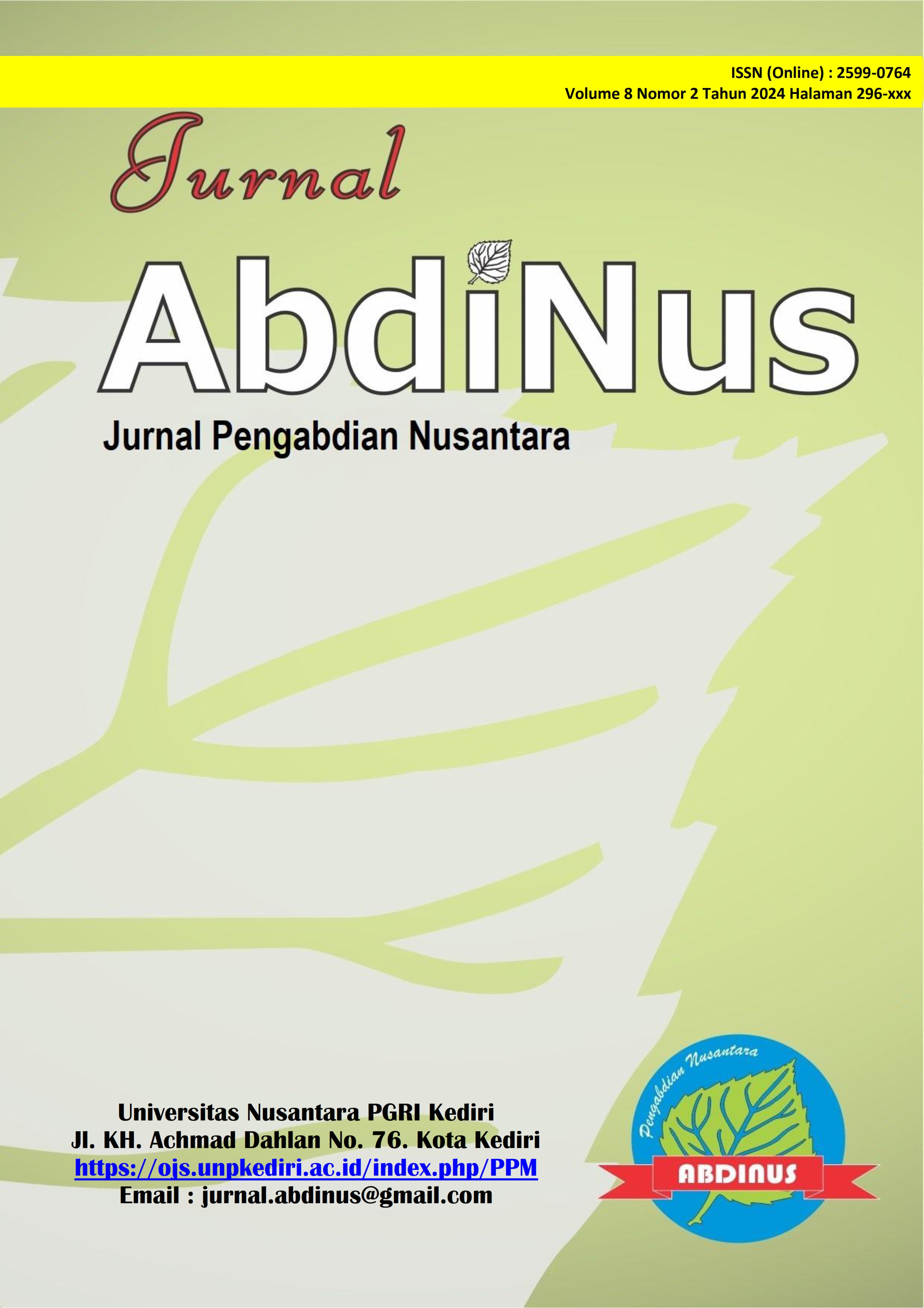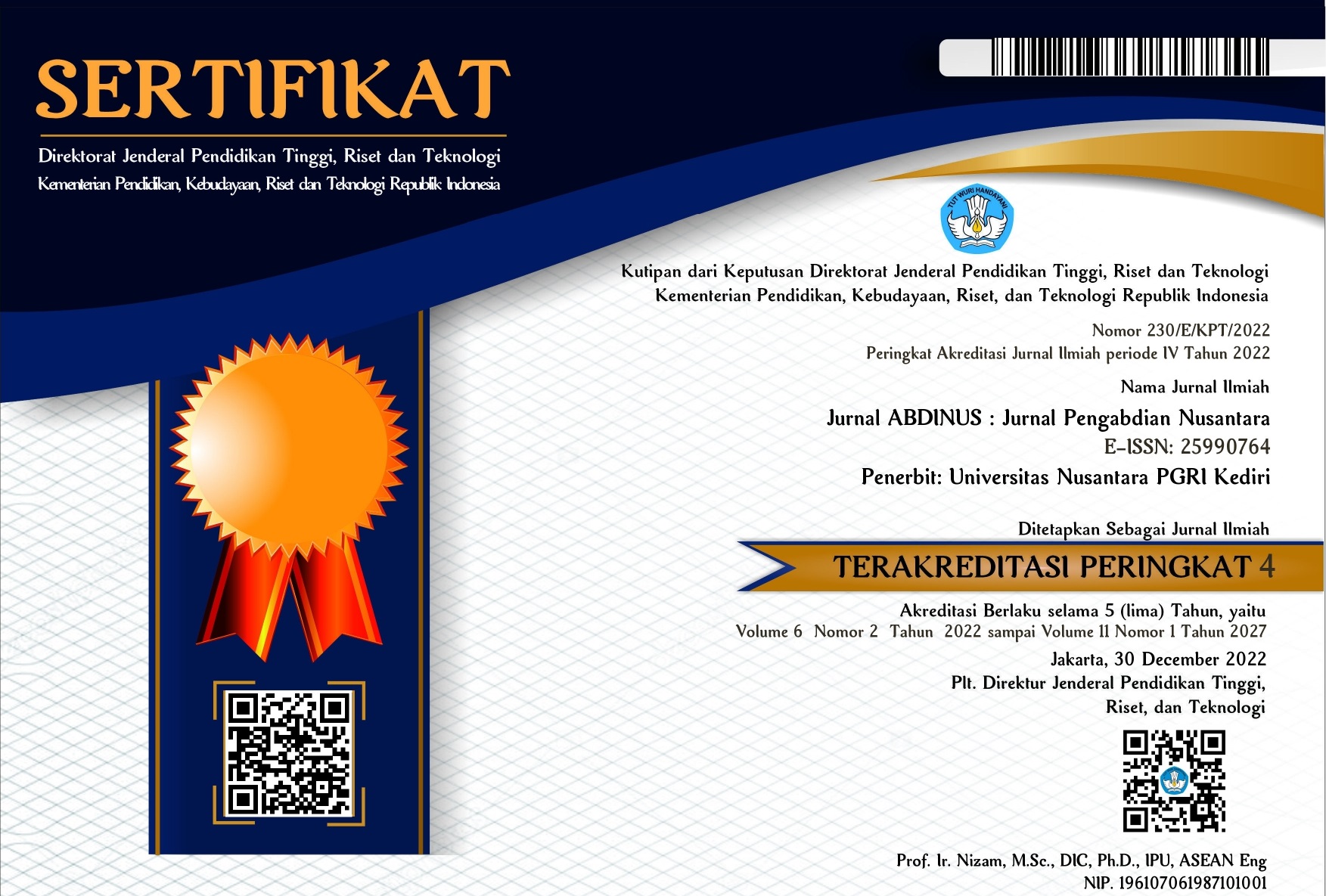Pendampingan Pengasuhan Ibu dengan Anak Usia Pra Sekolah melalui Kelompok Bright Mom di TK ABA Bangsalsari
DOI:
https://doi.org/10.29407/ja.v8i2.23538Keywords:
Gadget, Mentoring, Mother, ParentingAbstract
The use of gadgets is increasing very rapidly among preschoolers which can lead to health problems and technology addiction. The dual role of a mother is one of the factors that influences the mother's attitude towards gadgets in children. This community service aims to provide parenting assistance by forming a group of wise mothers in the digital era. The method used is by planning, forming groups and providing materials and assistance. The result of this assistance is an increase in the mother's understanding to be wise in the digital era by 25.11. The level of effectiveness of assistance is 59.44%, which means that the effectiveness of this assistance is in the moderate category. Mothers are the first school for their children, so the mother's perception of the concept of parenting from various perspectives is a benchmark for the success of a mother's parenting pattern.
Downloads
References
Al Sagr, N. A., & Al Sagr, A. N. (2020). The effect of electronics on the growth and development of young children : A Narrative Review. Journal of Health Informatics in Developing Countries, 14(1), 1–13. https://jhidc.org/index.php/jhidc/article/view/250
Almaqhawi, A., & Albarqi, M. (2022). The effects of technology use on children’s physical activity: a cross-sectional study in the Eastern province of Saudi Arabia. Journal of Medicine and Life, 15(10), 1240–1245. https://doi.org/10.25122/jml-2022-0148
Ardiyana, R. D., Akbar, Z., & Karnadi, K. (2019). Pengaruh keterlibatan orang tua dan motivasi intrinsik dengan kepercayaan diri anak usia dini. Jurnal Obsesi: Jurnal Pendidikan Anak Usia Dini, 3(2), 494-505. https://doi.org/10.31004/obsesi.v3i2.253
Badria, A., & Marlina, L. (2022). Islamic Parenting: Aktualisasi Konsep Prophetic Parenting Rasulullah SAW Dalam Menanamkan Pendidikan Karakter Pada Anak Usia Dini Di RA Perwanida 4 Palembang. Jurnal Ilmiah Multidisiplin, 1(5), 1046–1058.
Erny, E., Prasetyo, O., & Soekanto, A. (2022). The Impact of Using Gadgets at Early Age on The Brain Development of Infants and Children (Literature Review Article). Jurnal Ilmiah Kedokteran Wijaya Kusuma, 11(2), 183. https://doi.org/10.30742/jikw.v11i2.2225
Frosch, C. A., & Schoppe-sullivan, S. J. (2019). A nalytic Parenting and Child Development : A Relational Health Perspective. 15(1), 45–59. https://doi.org/10.1177/1559827619849028
Handayani, O. W. K., Yuniastuti, A., Abudu, K. O., & Nugroho, E. (2021). Gadget Addiction and The Effect of Sleep Habit, Stress, Physical Activity to Obesity. Malaysian Journal of Public Health Medicine, 21(1), 1–8. https://doi.org/10.37268/MJPHM/VOL.21/NO.1/ART.272
Hanif, M. (2023). Parenting Patterns of Children and Family Functions in Social Capital Perspective. International Journal of Social Science and Religion (IJSSR), 209–234. https://doi.org/10.53639/ijssr.v4i2.178
Joaquim, G. (2023). The Perils of Gadgets for Toddlers: An In-Depth Exploration of Potential Hazards on Physical, Cognitive, and Socio-Emotional Development. International Journal Publishing INFLUENCE: International Journal of Science Review, 5(2), 426–437. https://influence-journal.com/index.php/influence/index426
Khotimah, K. (2022). Tahap Pendidikan Anak dalam Islam: Metode Pendidikan Anak Ala Nabi Muhammad SAW. Jurnal Agama dan Hak Azazi Manusia.
Novianti, R., & Maria, I. (2019). The Role of Parents in Assisting the Use of Gadget in Alpha Generation. 978–979.
Putri, A. N. (2019). Hubungan Pola Asuh Orang Tua Terhadap Tingkat Kecerdasan Emosional pada Anak Usia Pra Sekolah. Madiun: Stikes Bhakti Husada Madiun.
Rashid, S. M. M., Mawah, J., Banik, E., Akter, Y., Deen, J. I., Jahan, A., Khan, N. M., Rahman, M. M., Lipi, N., Akter, F., Paul, A., & Mannan, A. (2021). Prevalence and impact of the use of electronic gadgets on the health of children in secondary schools in Bangladesh: A cross-sectional study. Health Science Reports, 4(4), 1–9. https://doi.org/10.1002/hsr2.388
Riska Nofianti, F., Fauzi, & Nur Hafidz. (2023). Pola Asuh Islami pada Anak Usia Dini dalam Buku Cara Rasulullah Saw Mendidik. Generasi Emas, 6(2), 103–115. https://doi.org/10.25299/ge.2023.vol6(2).13330
Safitri, P. W., & Elsanti, D. (2022). The Effect of Gadget on Mental Health Status and Social Interactions in Students at Public Junior High School 3 Pekuncen, Pekuncen Sub-District, Banyumas Regency. Proceedings Series on Health & Medical Sciences, 3(2016), 62–66. https://doi.org/10.30595/pshms.v3i.621
Saikia, H., Bhattacharyya, D. N., & Baruah, D. M. (2023). Review of educational toy design elements and their importance in child development from a cognitive perspective. The Pharma Innovation, 12(5), 1030–1033. https://doi.org/10.22271/tpi.2023.v12.i5n.20049
Suherman, R. N., Saidah, Q., Nurhayati, C., Susanto, T., & Huda, N. (2021). The relationship between parenting style and gadget addiction among preschoolers. Malaysian Journal of Medicine and Health Sciences, 17(June), 117–122.
V., R., B. S., S., & Karinagannanavar, A. (2020). Exposure to electronic gadgets and its impact on developmental milestones among preschool children. International Journal Of Community Medicine And Public Health, 7(5), 1884. https://doi.org/10.18203/2394-6040.ijcmph20202000
Vansdadiya, R. P., Gondaliya, P. R., Vasoya, N. H., & Gupta, S. M. (2024). Recommendations On How Educational Toys Can Help Preschoolers To Improve Their Social Skills. Theory and Practice, 2024(3), 975–979. https://doi.org/10.53555/kuey.v30i3.1422
Zain, Z. M., Jasmani, F. N. N., Haris, N. H., & Nurudin, S. M. (2022). Gadgets and Their Impact on Child Development. Mcmc, 6. https://doi.org/10.3390/proceedings2022082006















